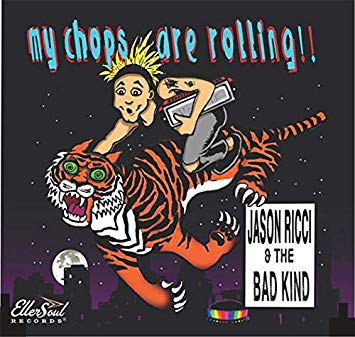
Jason Ricci’s harmonica playing has been described with almost every superlative in the thesaurus. The praise is for good reason: Ricci’s playing introduced a new benchmark for blues virtuosity and encouraged a rising generation of players to pursue blinding speed, overblows and even scales and theory. Considering that, let’s start with the literal: Ricci’s new album My Chops Are Rolling has just been released. Unlike the heavy and occasionally bleak release Approved By Snakes, which dealt with Ricci’s real life struggles with addiction and mental illness, My Chops is a celebration of life and second chances and, believe it or not, American football and fast food. Despite the plaudits, Ricci is both humble and effusive, and has worked for decades to become a musician known for the entirety of his performances, not just his harmonica playing. That said, the new record contains plenty of beyond-worthy solos as well as reimaginings of two of his better known songs. Ricci talked to us about the record and his thoughts on seeing his playing copied around the world.
Where did the title My Chops Are Rolling come from?
We had a bass player who was a great musician but a bad band member. He was always late and smoking too much weed and never helped us load the vehicle. He’d show up after everything was loaded like, “Hey, what can I do?” We got sick of it one night in San Francisco and I threatened to fire him. I told him he had to get it together or he was fired. And he said: “That’s fine. You can drop me off anywhere, ’cause my chops are rolling.” (laughs). When he said that, we were like, “That’s the most arrogant thing that’s ever been said but it’s also awesome.” So it became our degenerate anthem. We all have our quirks that are completely unacceptable but we keep our jobs. So we say, “My chops are rolling.” It can apply to anything – it’s all about someone being so talented you still get work even if you behave poorly.
Can you tell me how the album came together?
We’ve been playing a lot of these songs for a while. We went into the studio with many of the songs finished and road tested. A few of them evolved during the recording. The recording got put on hold until November of last year. It was mixed and mastered in January and is available here now.
Did you have any ideas or overarching themes for the record?
The whole idea with this record was to make it more lighthearted. The Way I Hurt Myself is on there but we redid it. I wanted to record Caprice in C Minor at the end of that because everyone asks for that. I think vocally I did that song better than on Rocket Number 9. But (the song) sort of doesn’t fit the record – the same as Snowflakes and Horses. That song was from my second record and was stolen from an R.L. Burnside tune, not completely but enough that the Burnsides recognize it (laughs). But they are cool with it! Those two songs are actually the only ones I had to sing again because I was in too good of a place when I did them. I was too cheerful. I had to go back and put myself in a different mind-frame and think about the time periods that those songs came from. I needed to tap into the sense of hopelessness those songs have.
Was that a challenge? Do you try to put those emotions on the shelf now?
No, that shit just comes out naturally. Most of the vocals were done live and ended up being kept because they were so fun. Maybe it wasn’t my number one vocal performance ever but you can tell I was feeling the tune. On those (two earlier) tunes it was the opposite – you could tell I wasn’t feeling it. I was just getting through the vocal parts so I could play the harmonica. We had to redo them. I really enjoy the harmonica playing that came out of a few of these songs. Break In The Rain was done in one take and I’m really proud of that solo. It’s just hard to redo it live because I was having so much fun doing it.
I know you’ve talked before about how, when you started singing, it was a struggle and you didn’t like it. As you’ve evolved over the decades as a musician do you find it’s easier and that you don’t just think about singing as a means to get to more solos?
Yes, there are songs now where, if I didn’t play harmonica, the audience would be ok. That’s not every time (laughs). But on a few of them I can just sing! That feels good. When I am getting ready to start a piece of music and I’m excited about singing, that’s fun. It’s a great feeling when the audience enjoys what I’m doing vocally.
Is it a challenge as an artist that some people are coming to hear the harmonica but you want to provide them with more and show them other things going on in the music?
It never offends me if people come for the harmonica. I like working from an underdog standpoint. The element of surprise is better. It’s better when people are like, “Let’s see this great harmonica player.” They didn’t expect great songwriting and his wife singing and a really great band and passable vocals. That’s wonderful when that happens. Then you know you are really doing something outside of wanking on an instrument. It’s not that I don’t wank on an instrument (laughs). But I do have some other things going on too. I love the element of surprise. I love when people only expect one thing out of a show.
There are still some very fast passages and licks on this album but it’s not like you have your version of Mellow Down Easy where you blaze through the song. It seems like you are finding new and interesting ways of using the technique.
I’d agree, and part of that is living in New Orleans and thinking about where I place the notes. It’s not that I’m not concerned with playing fast or keeping up my ability to play at fast tempos. That’s still paramount in what I practice. I don’t want to lose that. It’s not like I think, “I need to slow down and less is more.” I am just more interested in note placement and where beats drop and where I place the notes. What beat will it drop on? Will it be ahead or behind or on the beat? That’s what you hear from the players in New Orleans who have been around – the incredible sense of phrasing and where they start and stop. That’s what I’ve tried to do on Snakes and this record. The next record will be even more of a New Orleans sound.
How did you decide to cover Led Zeppelin’s Going To California?
That was John’s (Lisi, guitar) idea, although I really loved the melody. I love the sound of an acoustic harmonica and the major pentatonic scale. Some nights I play that mixolydian but I largely choose to play this major. I wanted a really soft and pretty song on the record. The solo is a very hard one to duplicate live because the variables affect how you play. There are also some fast licks that might sound easy but they aren’t because it’s hard to feel where the double time is with the drum beat. So, recreating that solo is a challenge.
Any other interesting stories behind any of the solos?
Think It Over I probably did about 20 times. Most musicians would never admit that and would say it was done on the first take. I just wanted to get it right in there, with all the punches the band was doing. It wasn’t easy to orchestrate my solo around the punches. The hardest part was getting the phrasing to fit where it made sense with the punches. The engineer wanted to kill me by the end of it. I’m also someone who doesn’t want to string together parts. I don’t believe in it. It might work for other people but I always feel like if I can’t do it in one take I won’t print it. People get very frustrated with me sometimes. On someone else’s record I will do whatever they want. But on my record? If they want to fix one note that’s out of tune they can, but the solo has to be intact.
Speaking of solos, I’ve always wondered what it’s like to see people try to replicate your solos note-for-note on the Internet.
It’s pretty weird. I like it a lot but I’m reminded what Pat (Ramsey, Ricci’s mentor) must have felt like. Actually, I know what he felt like (loud laughter). I think I take it a lot better than he did. It’s flattering but then I need to learn a bunch of new shit because people are doing my shit. One reason I give away so many licks and patterns and ideas is that, if you give something away, you get more in return. If you hold on to it, people will figure it out anyway. If people can figure out Howard’s (Levy) stuff, they can figure out mine.
Ultimately, is it a good thing to copy solos? Can you discover your voice through other’s voices?
Yes. It’s not the way but it’s a gateway. A better path is to try to figure out what I was thinking. How did I come up with it? A lot of times, by doing it, you can go back and reconsider it and see things like, “He is arpeggiating the IV chord.” You only see that after you learn.
If you just learn something by ear and don’t think about what choices were made, you won’t learn anything except how to do that solo. It’s like learning to speak off TV.
Maybe try to break a lick down to a smaller section. People approach me all the time wanting to learn my material. I don’t mind showing them but sometimes it’s just something I played that day. I’m not saying I don’t have licks but using licks is a bad night for me. A good night is playing music where I don’t know what the hell I played. I won’t remember what’s on bar nine.
What I remember you telling me years ago was learn triplets and 16th notes. Learn some scales. And think of the harmonica like a drum set.
I need to remember that myself sometimes!
For more about Jason Ricci go here

Comments
Got something to say? Post a comment below.